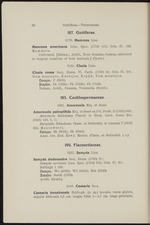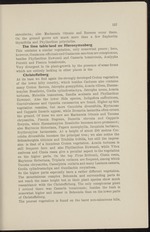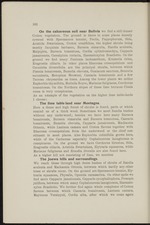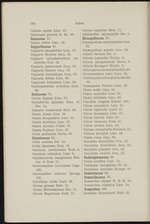|
|
|
Your search within this document for 'pipa,rosea' resulted in four matching pages.
|
| 1 |
 |
“...68
Guttiferae—Turneraceae.
187. Guttiferae.
5176. Mammea Linn.
Mammea americana Linn. Spec, (1753) 512; Gris. FI. 108.
Mammeia.
Cultivated. [Baham,, Antill., Nova Granata, Guiana, cultivated
in tropical countries of both hemisph.] (Symb.).
5181. Clusia Linn.
Clusia rosea Jacq. Enum. PI. Carib. (1760) 34; Gris. FI. 107.
Dam maatsjoe, Koetsjoe, Kopijk, Tam maatsjoe.
Curasao: C (5018).
Bonaire : Fk (7336); Fk (7338); Fk (7343).
Baham., Antill., Panama, Venezuela. (Symb.).
195. Cochlospermaceae.
5251. Amoreuxia Moq. et Sessé.
Amoreuxia paltnatifida Moq. et Sessé ex D C. Prodr. II (1825) 638;
Amoreuoria Schiedeana Planch, in Hook. Lond. Journ. Bot.
(1846) 140. t. 1;
Euryanthe Schiedeana Cham, et Schlechtd. in Linnaea V (1830)
224. Manoeweeri.
Curasao: Sk (5045); Sk (5046).
Amer. bor. (Ind. Kew.); Mexico. (Cham, et Schlechtd. 1. c.).
199. Flacourtiaceae.
5337. Samyda Linn.
Samyda dodecandra Jacq. Enum. (1760) 21;
Samyda serrulata Linn. Spec. (1762) 558; Gris. FI. 25;
Boldingh I 136.
Curasao:...”
|
|
| 2 |
 |
“...Brasiletto becomes more prominent;
also Maytenus Sieberiana, Fagara monophylla, Jacquinia barbasco,
Erythroxylon havanensis. At a height of about 200 metres Coc-
coloba diversifolia becomes the principal tree; we also notice the
Schomburgkia tibicinis and Trichilia trifolia, but still the impres-
sion is that of a luxurious Croton vegetation. Acacia tortuosa is
still frequent here and also Phyllanthus Euwensii, while Yitex
umbrosa and Clusia rosea give a peculiar aspect to the vegetation
on the higher parts. On the top Ficus Brittonii, Clusia rosea,
Maytenus Sieberiana, Triplaris coriacea are frequent, among which
Tecoma chrysantha, Caesalpinia coriaria and many Lantana camara,
Cordia cylindrostachya and Gundlachia corymbosa.
So the higher parts especially have a rather different vegetation.
The mountainous complex Behoenda and surrounding parts do
not reach the same height but in their plant species show much
resemblance with the Christoffelberg. The only conspicuous plant
I noticed there...”
|
|
| 3 |
 |
“...ground we find many Panicum lachnanthum, Krameria ixina,
Eragrostis ciliaris. In other places Rhacoma crossopetalum and
Coccoloba diversifolia are the principal shrubs, between which
Pisonia bonairensis, Bumelia obovata, Guaiacum sanctum, Beureria
succulenta, Metopium Brownei, Casearia bonairensis and a few
Tecoma chrysantha as trees. Among the lower plants we notice
Euphorbia thymifolia, Morinda Royoc, Mariscus fuligineus, Corchorus
tomentosus. On the Northern slopes of these lime terraces Clusia
rosea is very conspicuous.
As an example of the vegetation on the higher lime table-lands
I choose:
The lime table-land near Montagna.
Here a dense and high forest of shrubs is found, parts ot which
remind us of a thick wood. Sometimes we meet Randia bushes
without any underwood; besides we have here many Bursera
'bonairensis, Bursera simaruba and Bursera tomentosa, Casearia
bonairensis, Bumelia obovata, Capparis jamaicensis, Machaonia
Ottonis, while Lantana camara and Croton flavens together with
Rhacoma...”
|
|
| 4 |
 |
“...8.
Chloris Suringari Hitchc. 8.
Chlorophora tinctoriaGaudich.20.
Chrysobalanus icaco Linn. 34.
Cienfuegosia heterophylla Garcke
66.
Cissampelos Pareira Linn. 30.
Cissus acida Linn. 62.
Cissus sicyoides Linn. 61.
Cissus trifoliata Linn. 62.
Ci trull us vulgaris Schrad. 106.
Citrus aurantium Linn. 47.
Citrus bigaradia Loisel 47.
Citrus decumana Linn. 47.
Citrus limetta Risso 47.
Citrus limonum Risso 47.
Citrus medica Linn. 47.
Cleome stenophylla Klotzsch. 31.
Clitoria ternatea Linn. 42.
Clusia rosea Jacq. 68.
Goccoloba diversifolia Gris. 22.
Coccoloba diversifolia Jacq. 22.
Coccoloba punctata Gris. 22.
Coccoloba uvifera Jacq. 22.
Cochlospermaceae 68.
Cocos nucifera Linn. 14.
Codiaeum variegatum Bl. 55.
Colubrina reclinata Brongn. 61.
Combretaceae 82.
Commelinaceae 16.
Commelina elegans H. B. K. 16.
Commelina virginica Linn. 16.
Compositae 106.
Condalia Henriquezii Bold. 61....”
|
|
|
